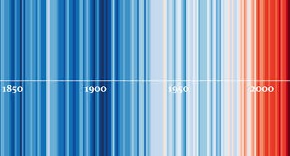來源于《社論》版塊
The climate issue
氣候問題
Climate change touches everything this newspaper reports on. It must be tackled urgently and clear-headedly
氣候變化關(guān)系到本刊所報(bào)道的一切。這一問題必須迫切而清醒地加以解決
From one year to the next, you cannot feel the difference. As the decades stack up, though, the story becomes clear. The stripes on our cover represent the world’s average temperature in every year since the mid-19th century. Dark blue years are cooler and red ones warmer than the average in 1971-2000. The cumulative change jumps out. The world is about 1℃ hotter than when this newspaper was young. To represent this span of human history as a set of simple stripes may seem reductive. These are years which saw world wars, technological innovation, trade on an unprecedented scale and a staggering creation of wealth. But those complex histories and the simplifying stripes share a common cause. The changing climate of the planet and the remarkable growth in human numbers and riches both stem from the combustion of billions of tonnes of fossil fuel to produce industrial power, electricity, transport, heating and, more recently, computation.
從一年到下一年,你感覺不到差別。然而,隨著時(shí)間的推移,事情變得越來越清楚。封面上的條紋代表了自19世紀(jì)中葉以來每年的全球平均氣溫。深藍(lán)色年份比1971-2000年的平均年份更冷,紅色年份更熱。累積變化會(huì)跳出來。現(xiàn)在的世界比本刊剛創(chuàng)立的時(shí)候溫度要高1攝氏度。用一組簡單的條紋來代表人類歷史的這段時(shí)間似乎有些簡化。這幾年見證了世界大戰(zhàn)、技術(shù)創(chuàng)新、空前規(guī)模的貿(mào)易和驚人的財(cái)富創(chuàng)造。但是這些復(fù)雜的歷史和簡化的條紋有一個(gè)共同的原因。地球氣候的變化,以及人類數(shù)量和財(cái)富的顯著增長,都源于數(shù)十億噸化石燃料的燃燒,這些燃料用于生產(chǎn)工業(yè)動(dòng)力、電力、交通、供暖,以及最近的計(jì)算。
All around us
我們身邊的一切

That the changing climate touches everything and everyone should be obvious—as it should be that the poor and marginalised have most to lose when the weather turns against them. What is less obvious, but just as important, is that, because the processes that force climate change are built into the foundations of the world economy and of geopolitics, measures to check climate change have to be similarly wide-ranging and all-encompassing. To decarbonise an economy is not a simple subtraction; it requires a near-complete overhaul.
氣候變化影響著一切,影響著每一個(gè)人,這一點(diǎn)應(yīng)該是顯而易見的——當(dāng)天氣對窮人和邊緣人群不利時(shí),他們的損失應(yīng)該是最大的。不那么明顯但同樣重要的是,由于推動(dòng)氣候變化的過程已成為世界經(jīng)濟(jì)和地緣政治的基礎(chǔ),遏制氣候變化的措施必須同樣廣泛和全面。經(jīng)濟(jì)脫碳不是簡單的減法;這需要近乎徹底的改革。
To some—including many of the millions of young idealists who, as The Economist went to press, were preparing for a global climate strike, and many of those who will throng the streets of New York during next week’s un General Assembly—this overhaul requires nothing less than the gelding or uprooting of capitalism. After all, the system grew up through the use of fossil fuels in ever-greater quantities. And the market economy has so far done very little to help. Almost half the atmosphere’s extra, human- made carbon dioxide was put there after the turn of the 1990s, when scientists sounded the alarm and governments said they would act.
對一些人來說——包括《經(jīng)濟(jì)學(xué)人》付印時(shí)正在為全球氣候罷工做準(zhǔn)備的數(shù)百萬年輕理想主義者中的許多人,以及下周聯(lián)合國大會(huì)期間將涌上紐約街頭的許多人——這種改革只需要把資本主義趕出或鏟除。畢竟,這個(gè)系統(tǒng)是通過使用越來越多的化石燃料發(fā)展起來的。到目前為止,市場經(jīng)濟(jì)也沒有提供多少幫助。20世紀(jì)90年代初,科學(xué)家拉響了警報(bào),各國政府表示將采取行動(dòng),之后,大氣中幾乎一半的、人為制造的、額外的二氧化碳被排放到大氣中。
譯文由可可原創(chuàng),僅供學(xué)習(xí)交流使用,未經(jīng)許可請勿轉(zhuǎn)載。












